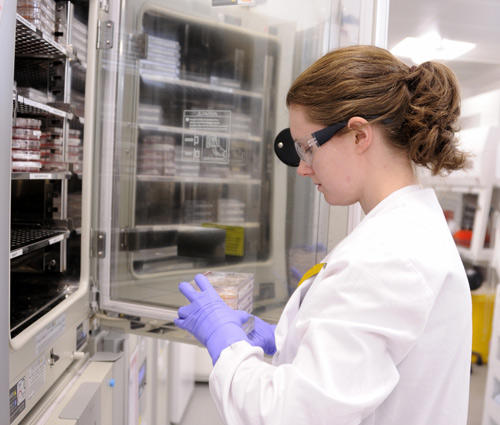Cellular Operations
Overview
 Cellular Operations consists of approximately 60 scientists with specialist skills and experience across a number of key technology platforms:
Cellular Operations consists of approximately 60 scientists with specialist skills and experience across a number of key technology platforms:
Induced Pluripotent Stem (iPS) Cells
We generate human iPS cells from blood and skin samples and differentiate those pluripotent cells into a range of different cell types. Current protocols include macrophage, cortical and dopaminergic neurons. This work is performed by our Cellular Generation and Cellular Screening groups.
Organoids
We have expertise in the derivation and culture of 3D organoid lines from human tissue samples. In particular the team have extensive experience the generation of organoid models from tumours to develop new cellular models for cancer research. This work is performed by our Cellular Generation and Phenotyping team.
CRISPR Screening
We carry out large scale CRISPR-Cas9 screens in a range of different cell lines. These screens allow investigators to study the impact of genetically altering thousands of genes in the genome in a single experiment. This work is performed by our Cellular Generation and Cellular Screening groups and Gene editing teams.
Genome engineering
We use highly efficient methods that take advantage of CRISPR-Cas9 technology to genetically engineer a range of cell types. Current services offered include gene knockouts, SNP introduction, protein tags and vector construction. This work is performed by our Gene editing team
Flow Cytometry and Cell Sorting
Our Flow Cytometry team offer investigators state of art instrumentation and expertise in flow cytometry. The facility is equipped with four high throughput cell analysers and five cell sorters.
The majority of our work involves collaborating with other teams to carry out specific scientific projects. In addition, we also undertake our own R&D to develop tools, establish new platforms and processes and to identify potential efficiency improvements. R&D is carried out by scientists within all of our teams as well as in our dedicated R&D team.


